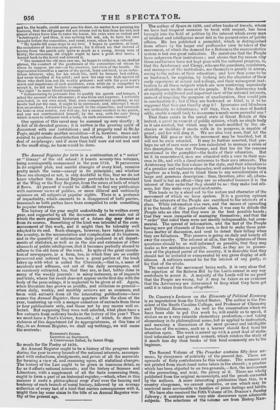The author of Spain in 1830, and other books of
travels, whom we have had frequent occasion to treat with respect, has been brought into the field of politics by the interest which every man of intellect and intelligence must feel in the present crisis of public affairs. He has published a pamphlet, which is distinguished• from others by the larger and profounder view he takes of the movement, of which the demand for a Reform in the representative system is but one great indication. He maintains that the People have outgrown their institutions ; and shows that the reason why those institutions have not kept pace with the national progress, is, that the Aristocracy and Clergy, who are the guardians, regulators, and managers of the institutions, are themselves greatly in arrear, owing to the nature of their education; and how they come to be so backward, he explains, by looking into the character of their early experience at school and college, and their subsequent inat- tention to all those subjects which are now conferring superiority of intelligence on the mass of the people. If the Aristocracy took an equally enlightened and important view of thd.national interests, instead of impeding the progress of amelioration, they would join in accelerating it ; but if they are backward or blind, is it to be supposed that they can thereby stop it ? Ignorance and blindness are ordinarily no advantages ; will they, then, in a case of fearful odds, enable a small body to overcome a much more powerful one ? That there exists in the social state of Great Britain at this instant, a great movement of public opinion, which no single body in it can control, but which may be much modified by the ob- stacles or facilities it meets with in its progress, is capable of proof; and few will deny it. We are also very sure, that let the Reform Bill pass or not, the movement may be troubled, but it will not be even retarded. It may be further asserted, that per- haps no set of men were ever less calculated to manage a crisis of this description than our Peerage, and that too for the reasons mentioned in the pamphlet—the faults of their education. But let it be remembered, men are educated with a view to their suc- cess in life, and with a direct reference to their own interests. The Aristocracy has the lion's share in the state, and their education is of a peculiar and exclusive character, well calculated to keep them together as a body, and to blind them to any considerations of a large and generous description : thus, therefore, after all, educa- tion itself is but an effect—they are so educated because it is the interest of their order that they should be so : they make bad citi- zens, but they make very good aristocrats. This leads us by a short cut to the nature and character of the movement of which we have spoken. It is a growing opinion that the interests of the People are sacrificed to the interests of a class. While information was rare, and the means of spreading it in the hands of this particular class, it was easy to delude the People into an idea that they were in the best possible hands that they were incapable of managing themselves; and that the " order" that ruled them were not merely indispensable, but orna- mental. The spread of information, and the fact of the People having now got channels of their own, is first to make these posi- tions matter of discussion, and next to detect their fallacy when they are fallacious. This process is going on daily and hourly all over the country. The interest of all is, that the agitators of these questions should be as well-informed as possible, that they may make as few mistakes as possible. Next, as they are in posses- sion of the physical power of the country, it is desirable that they should not be irritated or exasperated by any gross display of self- ishness. A collision cannot be for the interest of any party, or for that of the whole.
The nature of the movement bein5, such, it is very clear that the rejection of the Reform Bill by the Lords cannot in any way contribute to arrest it. A majority of the Lords will be no proof that the People are wrong, but it may be taken as an evidence that the Aristocracy are determined to keep what they have got until it is taken from them altogether.


























 Previous page
Previous page